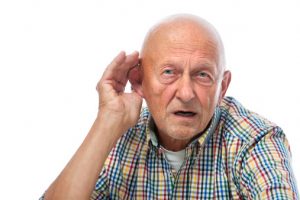 Hearing loss can be caused by noise or through aging – this much we know. But research suggests that serious sleep conditions could also rob you of your precious hearing.
Hearing loss can be caused by noise or through aging – this much we know. But research suggests that serious sleep conditions could also rob you of your precious hearing.
Sleep apnea is a condition that causes a person to stop breathing numerous times throughout the night. It has been tied to conditions such as hypertension, obesity, and even diabetes. Research findings suggest that sleep apnea can also be linked with hearing loss, stressing how important it is to get the condition under control.
Sleep Apnea Linked with Hearing Loss
Advertisement
The study uncovered that sleep apnea could contribute to hearing loss. Even after researchers considered other possible causes of hearing loss, the association remained.
Dr. Neomi Shah said, “Sleep apnea is more of a systemic and chronic disease than just something that happens when you’re sleeping. It probably affects multiple different organs, so I would probably urge we start thinking about sleep apnea as more like a chronic disease with vascular and inflammatory issues.”
But how exactly does your sleep affect your hearing? Well, researchers suggest that it can be a combination of inflammation and abnormal functioning in blood vessels. Dr. Shah explained, “The ear is prone to this kind of injury.”
The study reviewed data from nearly 14,000 U.S. participants from the Hispanic Community Health Study/Study of Latinos. All participants completed in-home sleep studies and hearing tests.
Roughly 10 percent of the participants had sleep apnea, and 30 percent had some sort of hearing impairment.
Those with hearing impairment were more likely to snore, be of Cuban or Puerto Rican descent, have higher body mass indexes (BMI), and were diagnosed with sleep apnea.
Sleep apnea was found to be associated with a 31 percent increase in high-frequency hearing impairment and 90 percent in low-frequency hearing impairment. Sleep apnea also increased the participants’ low and high frequency hearing impairment by 38 percent. Speech, for example, is considered low frequency.
It’s important to note that association does not necessarily translate to causation. As neuroscientist Dr. Rebecca Spencer added, “The number one thing I always say is, correlation is not causation; it doesn’t mean if you have sleep apnea, you’re at risk for hearing impairment. You wouldn’t know if one comes before the other: sleep apnea appears before hearing loss, or hearing loss appears before sleep apnea and maybe they don’t come together at all. They may not be related except by a third factor.”
Further research is required to confirm if sleep apnea can cause hearing loss. Furthermore, the study focused primarily on the Hispanic community, so further research should include other ethnicities as well.
Because sleep apnea is already linked with so many detrimental health consequences, the take home from the study is to ensure you are receiving treatment for sleep apnea in order to reduce the risk of its many complications, including hearing loss.
Dr. Shah concluded, “There is the potential that treating sleep apnea may improve hearing loss.”
Obstructive Sleep Apnea Prevention Tips
Side Sleeping Position
One of the best ways to reduce the risk of obstructive sleep apnea is to sleep on your side. Sleeping on your back can cause the tongue and soft palate to obstruct the airway. However, sleeping on your side keeps the airway clear and reduces the risk of obstructive sleep apnea. If you are struggling with obstructive sleep apnea, talk to your doctor about your best sleeping position.
Raise The Head of The Bed
People with obstructive sleep apnea are at increased risk for high blood pressure, heart disease, and stroke. One way to reduce the risk of obstructive sleep apnea is to raise the head of the bed. This helps to keep the airway open and allows for uninterrupted breathing. Raising the head of the bed can also help to reduce snoring.
Oral Appliances
If you have obstructive sleep apnea, you might benefit from using a machine that delivers air pressure through a mask while you sleep. This type of machine is called a CPAP machine, which can help keep your airway open and prevent apnea and snoring. However, it is important to note that CPAP machines are not right for everyone, so it is essential to speak with your doctor to see if CPAP is right for you.
Yoga
Advertisement
One possible way to help reduce the risk of obstructive sleep apnea is through yoga. Yoga helps to improve breathing and relax the mind and body, both of which can help people with obstructive sleep apnea. In addition, yoga can also help to improve flexibility and muscle tone, which may help to reduce the likelihood of developing obstructive sleep apnea in the first place. While there is no guarantee that yoga will completely prevent obstructive sleep apnea, it may be worth trying for those at risk for this condition.
Avoid Alcohol and Smoking
One of the best ways to reduce the risk of obstructive sleep apnea is to avoid alcohol and smoking. Alcohol relaxes the muscles in the throat and increases the risk of obstruction. Smoking damages the respiratory system and makes it more difficult to breathe. If you drink alcohol or smoke, you should talk to your doctor about ways to reduce your risk of obstructive sleep apnea.
Avoid Certain Medications
While obstructive sleep apnea can be caused by various factors, such as obesity or anatomical abnormalities, certain medications can also contribute to the development of the condition. Medications that are known to increase the risk of obstructive sleep apnea include sedatives, beta-blockers, and tricyclic antidepressants. Therefore, avoiding these medications can help to reduce the likelihood of developing obstructive sleep apnea. Talk to your doctor about alternative treatments if you are taking any of these medications and think you may be at risk for obstructive sleep apnea.
